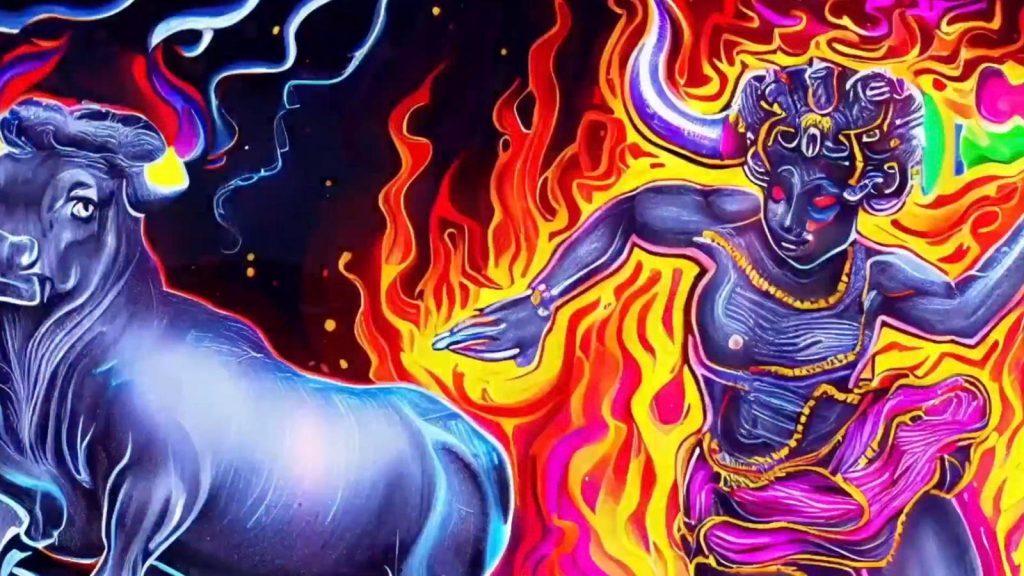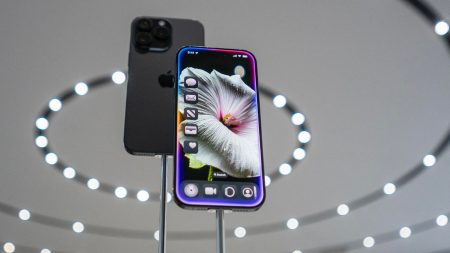Persephone, queen of the underworld in Greek mythology, has some pretty powerful advice for those of us roaming the overworld.
Don’t turn around; just
navigate Empty
Take a breath, forget how to breathe.
Stare at the moon.
That moment of zen is brought to you by “Future Mythologies, 2023,” a series of poems co-written with AI to explore the voices and stories of Greek mythological characters including Odysseus, Achilles, Icarus, Medusa, Artemis and Ariadne—with a sci-fi twist.
For the project, Nathaniel Stern, a professor of art and design at the University of Wisconsin-Milwaukee, turned to AI for help imagining the kind of performance prose 12 mythic leads might recite at a poetry slam in space. He tapped Sudowrite, a fiction writing generative AI tool powered by the same OpenAI natural language model that drives ChatGPT.
One fairly common perception when it comes AI-assisted art is that algorithms automatically usurp all human creativity. The poems in “Future Mythologies, 2023,” however, represent a true collaboration between person and machine.
“What came out often had a gem or two, but a lot of things that didn’t work for me effectively,” Stern said in an interview. “And so I’d very often go back and forth, edit and rewrite, reprompt, change the order and back again. In the end, most of the poems are a mix of my and the AI’s texts.”
The results are weird, intriguing and sometimes beautiful. Medusa overwrites tragedy with adventure. Icarus imagines flying upward in a spaceship (toward what it’s unclear). Odysseus gets existential when pondering his journeys:
I don’t fear the unknown.
But I feel it.
The whole picture is:
as it were,
as it will be,
as it could be;
it might be.
“My favorite things were the surprises, when occasionally the AI would confuse two myths,” Stern said, “or I’d prompt it to stutter … then shift to the voice of a demi-god.”
Stern recorded the poems in his voice and digital artist Anne Spalter created sound and images to illustrate the readings, some of which are accompanied by HD video. Stern pioneered digital fine arts courses at Brown University and the Rhode Island School of Design in the ‘90s and her work often incorporates a futuristic aesthetic.
“I love the sense of working with a mysterious partner in AI and running with concepts that emerge from the text-to-image process,” Spalter said in a joint interview with Stern for Expanded Art, which “turns Web3 inside out and expands the notion of a gallery and an online marketplace by being both.” Earlier this year, it presented an exhibition called Recollection: AI and Memory that included the 12 poems in “Future Mythologies, 2023.”
AI-assisted art, of course, raises complex questions. Some artists are excited about the creative possibilities afforded by rapidly advancing generative AI tools, while others fear their work is getting scraped from the internet to train AI datasets without permission, compensation or credit. Many creatives hold both both views simultaneously. Like Stern, Spalter stresses the iterative nature of partnering with AI, saying it’s not as simple as typing in prompts and getting back perfectly crafted works.
“You prompt, consider the results, adjust and repeat, in my case using multiple AI platforms and hand-tweaking images in Photoshop,” Spalter said in an interview. “It doesn’t take any less time or effort than other media or processes.”
One of Salter’s upcoming projects, “Mother Computer: Thinking With Natural and Artificial Intelligences,” aims to deepen conversations around AI and art through both digital art and a large-scale physical exhibition.
Stern created the poems at the request of TheVerseVerse, a digital gallery for writers. The team behind the platform asked Stern to write a series of poems for their GenText project, which explores the craft and creativity of generative AI by inviting poets to create language-based NFTs.
Stern often explores how people experience and engage with the world—and technology. For past projects, he’s burned and smashed consumer electronics to imagine what they might look like a million years from now. And he’s given Earth-bound social media addicts the chance to tweet to aliens.
Now we have some new poems to tweet to our extraterrestrial friends. “The moon is a trick,” reads the Persephone poem. Wonder what ET would have to say about that.
Read the full article here










